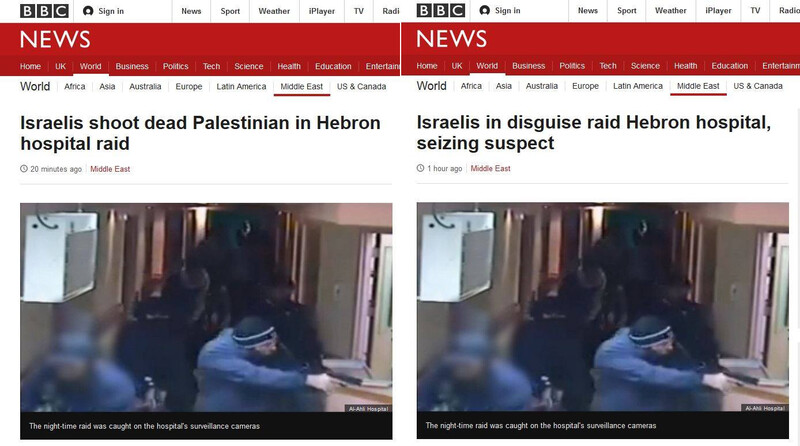Media Watch 19 November 2015

Before (left) and after: a BBC headline was changed to obscure the fact Israeli killed a Palestinian in cold blood. (Screenshots by Media Lens)
In the early hours of 12 November, approximately two dozen Israeli gunmen, one disguised as a pregnant Palestinian woman, others wearing fake beards, invaded a hospital in Hebron and gunned down a 28-year-old man.
In a rare burst of reporting on an Israeli atrocity, the BBC ran an article on its website headlined: “Israelis shoot dead Palestinian in Hebron hospital raid.”
It was a straightforward headline which summed up the story. But later in the day, a different headline appeared above the report, reading: “Israelis in disguise raid Hebron hospital, seizing suspect.”
As is standard practice for the BBC, the amendment was not noted at the bottom of the page, so newcomers to the story would not have known the headline had been altered.
It was spotted, however, by the watchdog Media Lens, which posted a screengrab of the two headlines on its Facebook page, asking: “What happened? Pro-Israeli flak? Bending to pro-Israeli pressure?”
These questions are even more pertinent in the light of a documented exchange which took place between the BBC, the Israeli Government Press Office (GPO) and the Israeli embassy in London at the beginning of October about another of the broadcaster’s headlines.
Headline changes
The Times of Israel reported then on Israeli fury sparked by the 4 October BBC Online headline “Palestinian shot dead after Jerusalem attack kills two.”
The headline is factually correct, but offense was caused to Israel’s PR machine because the killing of 19-year-old Muhannad Halabi took precedence in the headline over the slaying of two Israelis.
The Times of Israel wrote: “The [Israeli] Government Press Office on Sunday warned the BBC it could face sanctions for running a news headline highlighting the death of the Palestinian terrorist shot by the police Saturday after fatally stabbing two Israelis, rather than the attack itself.”
The website added that a “harshly worded letter was sent to Richard Palmer, the head of the BBC Bureau in Israel, by the head of the GPO,” and that “the Israeli Embassy in London asked the network to change the headline.”
Whatever the GPO’s harsh words were, they appear to have been enough to scare the BBC into changing the headline, which went through three alterations – documented by the Zionist lobby group BBC Watch – before it met with the satisfaction of the Israeli embassy and the Israeli GPO.
The Israeli-approved headline ran: “Jerusalem: Palestinian kills two Israelis in Old City.”
(This headline has since been changed again, apparently unnoticed by either the Israeli embassy or the GPO, to “Israelis killed in Jerusalem, Palestinians banned from Old City.”)
In its report of 4 October, The Times of Israel noted: “According to a GPO official, Israel expects an official apology from the network, and said the office was considering annulling the press cards of BBC journalists, a decision that if implemented would not allow the network to continue operating in Israel.”
This is not an idle threat, and BBC staff know it.
“A very evil light”
In 2003, the Israeli government severed ties with the corporation, accusing it of the “worst of Nazi propaganda” after it broadcast the documentary Israel’s Secret Weapon which shed light on the country’s nuclear and chemical arsenal.
Danny Seaman, then head of the Israeli GPO, said it was “because of what we feel to be a bias and an anti-Israel line … that portray Israel in a very evil light.” Seaman said government officials would no longer help BBC journalists get expedited press accreditation.
When Orla Guerin, then a BBC Middle East correspondent, questioned Israel’s repressive attitude towards the corporation, she too found herself in the Israeli government’s line of fire.
In an interview with the London Evening Standard in 2003, she said, “How can you still be a democracy and try to harass the press? This is not how a democracy behaves.”
Guerin was later pulled from the Middle East, the decision being announced just days after the BBC’s director general at the time, Mark Thompson, returned from a visit to Israel in 2005 where he met with then Prime Minister Ariel Sharon.
Influence
Journalist Keith Dovkants, writing in the London Evening Standard in 2012, noted that “on [Thompson’s] return to London the corporation instituted the Middle East reporting regime that exists today and which, many believe, influenced the decision to refuse to show the charity aid appeal for Gaza.”
This is a reference to the Disasters Emergency Committee appeal of January 2009, which was aired by major television channels to raise money for Gaza as another Israeli massacre there came to an end. But the BBC, in an unprecedented move, refused to show it.
Arthur Neslen, a journalist who worked at the BBC for four years, told me: “They take Israeli calls very seriously, and critical stories about Israel get shot down through official pressure and the fear of official pressure. These are very powerful lobbyists — people know their careers can be broken.”
Swedish academic and media expert Leon Barkho told Dovkants: “I have investigated this and I am convinced [BBC] policy is dictated from the top because of the enormous sensitivity … The message is: don’t antagonize the Israelis.”
And so the questions asked by Media Lens when the BBC amends a headline to soften public perception of an Israeli crime — “What happened? Pro-Israeli flack? Bending to pro-Israeli pressure?” – answer themselves.
It is a sad state of affairs for a news organization which prides itself as a leader in global journalism. BBC journalists and editors, it would seem, sit at their desks in London and cower in fear at the thought of an angry phone call from the Israeli embassy.
They let us all down, but, most of all, they let down the Palestinian people, whose cry for freedom goes unheard at BBC Broadcasting House, drowned out by the undemocratic machinations of the Israeli PR machine.






Comments
This is today's media
Permalink M Atif Bangash replied on
We should not believe what media is telling us, i believes 90% reporting on media is altered
Just who do these colonials
Permalink Bryan replied on
Just who do these colonials think they are, trying to dictate what the British people are allowed to hear. I suspect the effort is so consistently directed at the BBC because their journalistic standards are so much higher than the rest of the mass media (not high enough, but still better). Thus not only Brits but many others tend to trust the BBC as far more impartial than the commercial or state-controlled media that otherwise dominate. Correcting issues of fact is one thing, but bullying about the wording of headlines, and making threats is intolerable. Time the British government started campaigning for the Israel media to start accurately reporting its WMD, assassinations, child-murder, corruption etc. How can a government which exerts strict military and security censorship, and whose own own journalists are largely servile (some wonderful exceptions like Gideon Levy and Amira Hass) have such chutzpah as to lecture the rest of the world?
No rporter s are giving the
Permalink mamun ahmed replied on
No rporter s are giving the true news for their own self interest..what we see is the business of yellow journalism..publishing news for money..
Cowardly, disgraceful BBC
Permalink Amer Hudson replied on
Why not tell the Israelis to naff off?
I wonder if they've ever thought of that. Or considered it. If someone was bullying me, at work or in the street, that would be the first response I would want to make. But not the BBC. Why?
Thank the Lord Harry that I don't pay the BBC's licence fee. Because I found your news output so unbalanced, so devoid of actual news and analysis from the Middle-East, Europe, the Americas (there's more than one America, BBC) I finally told the BBC to naff off. And it felt good...
We have our own Zionist media pressure group.
Permalink Peter replied on
In Canada, the well funded (and ironically titled) "Honest Reporting" will attack any reporter or mainstream publication which presents a balanced report on Israel... which includes ANYthing which might impune the perfection of "The Only Democracy" (TM).
This includeds moblizing a blizzard of letters to the publications, editors, supervisors of those responsible. CBC Jerusalem-based reporter Derek Stoffel has been ridiculously one sided for years. When (experienced Mid-East reporter) Margaret Evans replaced him for a time and presented a more balanced view CBC was attacked for its antisemitism.... she's no longer there. I don't know that she wasn't simply providing Mr. Stoffel with vacation relief but it does seem suspicious.
Fortunately "Canadians for Justice and Peace in the Mid East" and "Independant Jewish Voices" often share info on H.R.'s attacks.
We never expected the BBC
Permalink Abdul replied on
We never expected the BBC will stoop to the pressure of the Zionist government.It lost its criditblity once again.
Israel's media torture
Permalink Mojamud replied on
This is expected from a regime that is ever prepared to harass, maim and kill innocent people. Shame on you BBC!!
Apparently there is never any
Permalink Anonymous replied on
Apparently there is never any need for Israel to protest or apply any such pressure to any American news or entertainment media...
Its not the Burka we should worry about!
Permalink Avi69 replied on
Calls to ban the burka in some EU countries is raising tensions amongst the Muslim community and those of us that do not have fears around women choosing this type of clothing. The bigotry argument stated is a false pretence to marginalise sections of our communities.
It seems we have to fear more from Israelis dressing as pregnant Palestinian women and wearing false beards in order to unlawfully kill a Palestinian in a hospital.
Should we ban Israelis from the EU as they could prove to be a terrorist in disguise or maybe ban all beards and pregnant women?